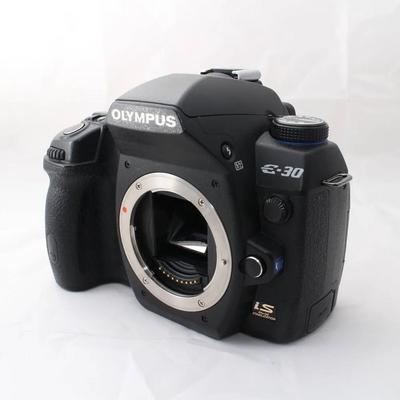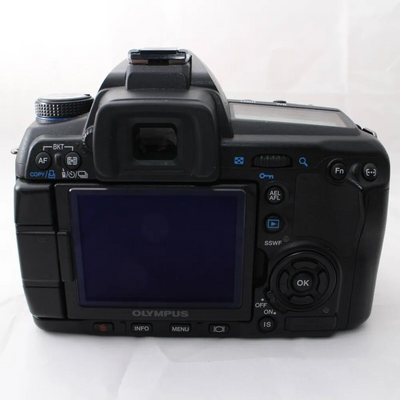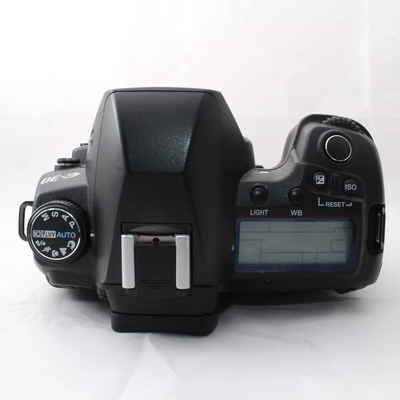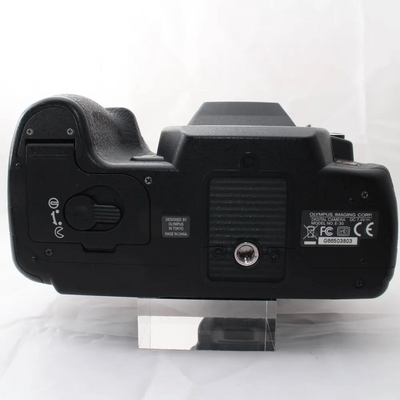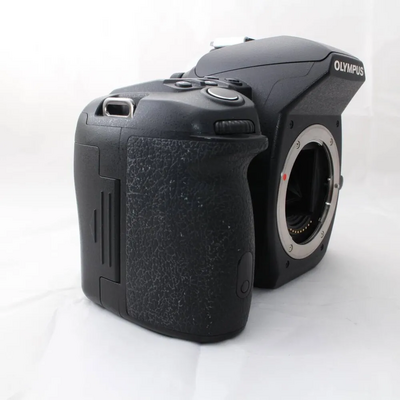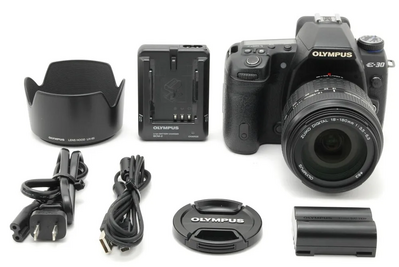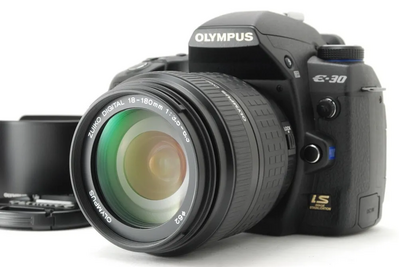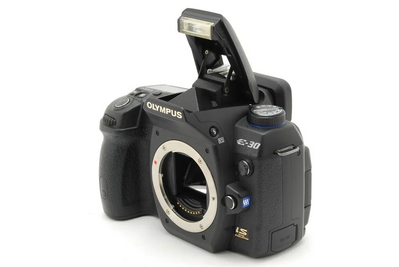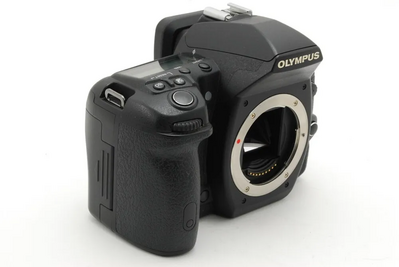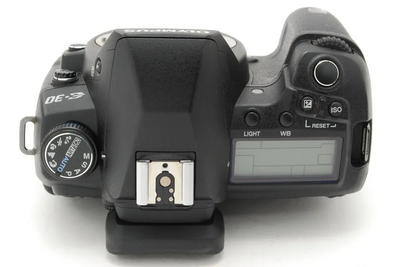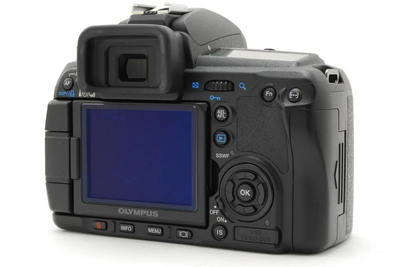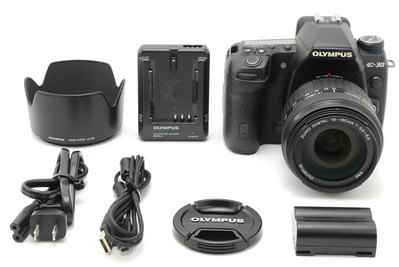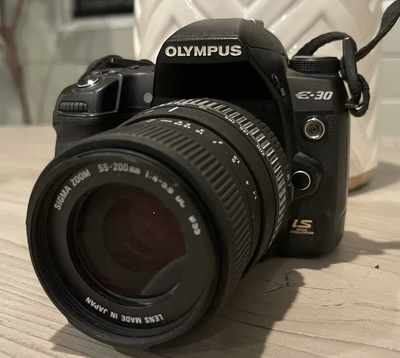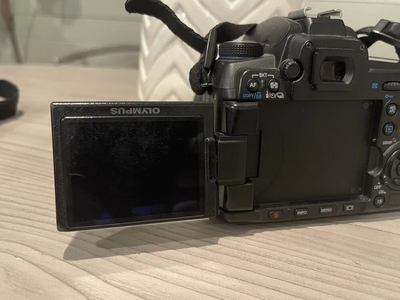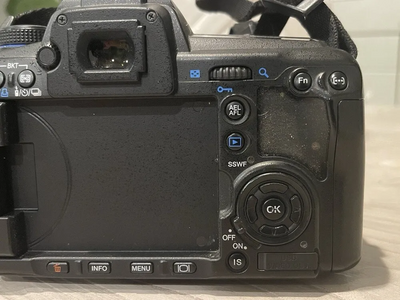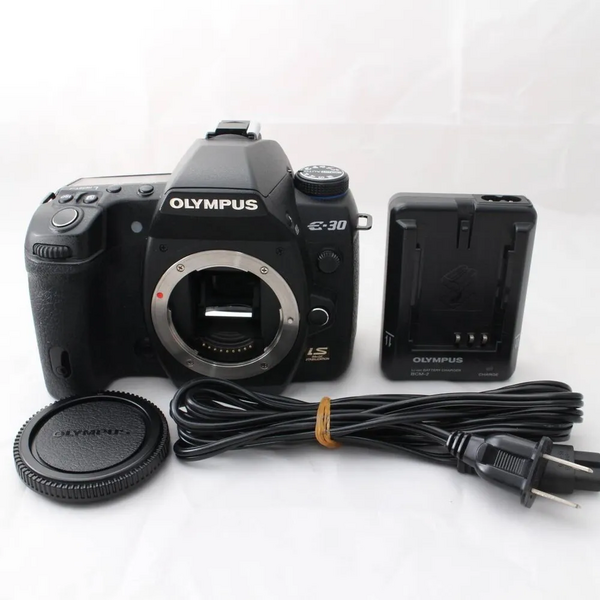
Olympus E-30
| Brand | Olympus 2008 |
| Model | E-30 |
| Released Year | 2008 |
| Type | DSLR Cameras |
| Series | E-Series |
| Color | Black |
| Status | Discontinued |
Quick view
Overview
The Olympus E-30 is a digital single-lens reflex (DSLR) camera launched in 2008, utilizing a 12.3 megapixel Live MOS sensor that delivers high-resolution images with impressive clarity. It features a Micro Four Thirds mount compatible with Zuiko lenses, providing versatility in focal lengths. The camera offers a 3-inch vari-angle LCD screen that aids in composing shots from various angles. It comes equipped with a 11-point AF system ensuring precise autofocus performance. The E-30 supports image stabilization to reduce blur caused by camera shake, enhancing image sharpness even in low light. Additionally, the camera's construction includes dust and splashproof sealing for durability in challenging shooting conditions.
Specifications
| Maximum Aperture |
|
| Series | Olympus EVOLT |
| Type | Digital SLR |
| Maximum Resolution | 12.3MP |
| Bundle Description | CAP, HOOD, BATTERY, BATTERY CHARGER, |
| Color | Black |
| Custom Bundle | Yes |
| Model | E-30 |
| MPN | 262030 |
| Country/Region of Manufacture | Japan |
| Battery Type | Lithium-Ion |
| UPC | 0050332166967 |
| Connectivity | USB |
| Depth | 2.953in |
| Width | 5.571in |
| Item Weight | 24 Oz. |
| Height | 4.232in |
| Screen Details | LCD Display-Tft Active Matrix-2.7"-Color |
| Exposure Compensation | ±5 Ev Range, in 1, 1/2 or 1/3 Ev Steps |
| Light Sensitivity | Iso Auto (200-3200), Iso 100-3200, Iso Auto (200-800) |
| Sensor Type | Live Mos |
| Max Shutter Speed | 1/8000 Sec |
| Exposure Range | Ev 1-20 (Iso 100) |
| Focal Length Equivalent to 35mm Camera | 24-120mm |
| Face Detection | Yes |
| Special Effects | Monotone, Light Tone, Black & White Green Filter, Pop Art, Portrait, Pale & Light Colour, Orange, Black & White Yellow Filter, Pin Hole, Red, Grainy Film, Soft Focus, Vivid, Black & White Orange Filter, Yellow, Sepia, Black & White Red Filter, Green, Custom Effect, Muted |
| Camera Flash Features | Af Illuminator, Fill-In Flash, Slow Sync, Flash +/- Compensation, Manual, Red-Eye Reduction Flash, Auto Flash |
| White Balance | Auto, Cloudy (Preset), Manual, Shade (Preset), Fluorescent (Preset), Daylight / Sunny (Preset) |
| Battery Form Factor | Manufacturer Specific |
| Focus Adjustment | Manual, Automatic |
| Expansion Slot | 1X xD-Picture Card, 1X CompactFlash Card-Type I/II |
| Sensor Size | 13.0x17.3mm |
| Display Size | 2.7in |
| Exposure Modes | Aperture-Priority, Shutter-Priority, Manual, Automatic |
| Still Image Format | Exif, Dpof, Raw Image, Dcf, Raw + JPEG, Raw, JPEG |
| Display Rotation | Rotating |
| Screen Size | 2.0".7" |
| Light Sensitivity Max | 3200 |
| Max Operating Temperature | 40°C |
| Optical Viewfinder Type | Fixed Eye-Level Pentaprism |
| Red Eye Reduction | Yes |
| Min Shutter Speed | 30 Min |
| Display Type | LCD |
| Sensor Resolution | 12.3MP |
| Exposure Metering | Multi-Segment, Spot, Center-Weighted |
| Additional Features | Photo Preview |
| Flash Type | Pop-Up Flash |
| Min Operating Temperature | 0°C |
| Viewfinder-Field Coverage | 98% |
| Exterior Color | Black |
| Features | Photo Preview |
| Connector Types | 1X Composite Video Output, 1X DC Power Input, 1X USB |
| Flash Modes | Red-Eye Reduction, Slow Synchro, Fill-In Mode, Off Mode, Auto Mode, Rear Curtain Sync |
| Dioptric Correction Range | -3 to +1 |
| Viewfinder Magnification | 1.02x |
| Camera Type | Digital SLR |
| Auto Focus Type | TTL Contrast and Phase Detection |
| Viewfinder Type | Optical |
| Lens for Sd | Body only |
| Supported Flash Memory | CompactFlash Card Type I, CompactFlash Card Type II, xD-Picture Card, Microdrive, Ibm Microdrive, CompactFlash |
| Continuous Shooting Speed | 5fps |
| Country | Japan |
| Shutter Count | 4267 |
| Viewfinder | Optical Viewfinder, No Mold or Dust |
| Warranty | Not included (used item) |
| Shipping | Japan Post Yu-Pack, Yamato Transport |
Images
Key Advantages
The Olympus E-30 boasts several advantages including a crisp 12.3 MP sensor that balances resolution and noise performance effectively. Its vari-angle LCD allows flexible composition and shooting from difficult positions. The comprehensive 11-point autofocus system delivers quick and accurate focusing on subjects. The camera's dust and splashproof build makes it suitable for outdoor photography in various weather conditions. Image stabilization within the body helps achieve sharper images without needing specialized lenses. Compatibility with a wide range of Zuiko lenses offers photographers creative freedom and optical quality.
Limitations
Despite its strengths, the Olympus E-30 has certain limitations such as a relatively modest ISO range compared to newer models, impacting low-light performance. Its image sensor size is smaller than full-frame alternatives, which can affect depth of field control and noise at high ISO settings. The camera's autofocus system, while good for its time, may not match the speed or accuracy of modern DSLR or mirrorless models. Video capabilities are basic and lack high-definition recording, limiting multimedia usage. The body is somewhat bulkier compared to contemporary cameras in the same class. Additionally, limited availability of some accessories may present challenges for users.
FAQ
What type of sensor does the Olympus E-30 use?
The Olympus E-30 uses a 12.3 megapixel Live MOS sensor.
Is the Olympus E-30 camera weather-sealed?
Yes, the Olympus E-30 features dust and splashproof sealing to withstand challenging environments.
Does the Olympus E-30 have image stabilization?
Yes, it includes in-body image stabilization to reduce blur caused by camera shake.
What is the screen size of the Olympus E-30?
The camera has a 3-inch vari-angle LCD screen.
Can the Olympus E-30 shoot video?
Yes, but its video capabilities are limited and do not support high-definition recording.
Is the Olympus E-30 still in production?
No, the Olympus E-30 was discontinued several years ago.
What lenses can be used with the Olympus E-30?
It is compatible with Olympus Zuiko lenses designed for the Micro Four Thirds mount.
Disclaimer
The content on is provided for general informational purposes only. We do not guarantee the accuracy, completeness, or reliability of any information, specifications, or visuals presented on the site.
is not responsible for any content, images, or data uploaded or shared by users. Users are solely responsible for the content they submit.
We may include links to third-party websites for convenience. We do not endorse or take responsibility for the content or policies of any external sites.
Use of the site is at your own risk. Always verify critical information independently before making decisions based on content from this website.

